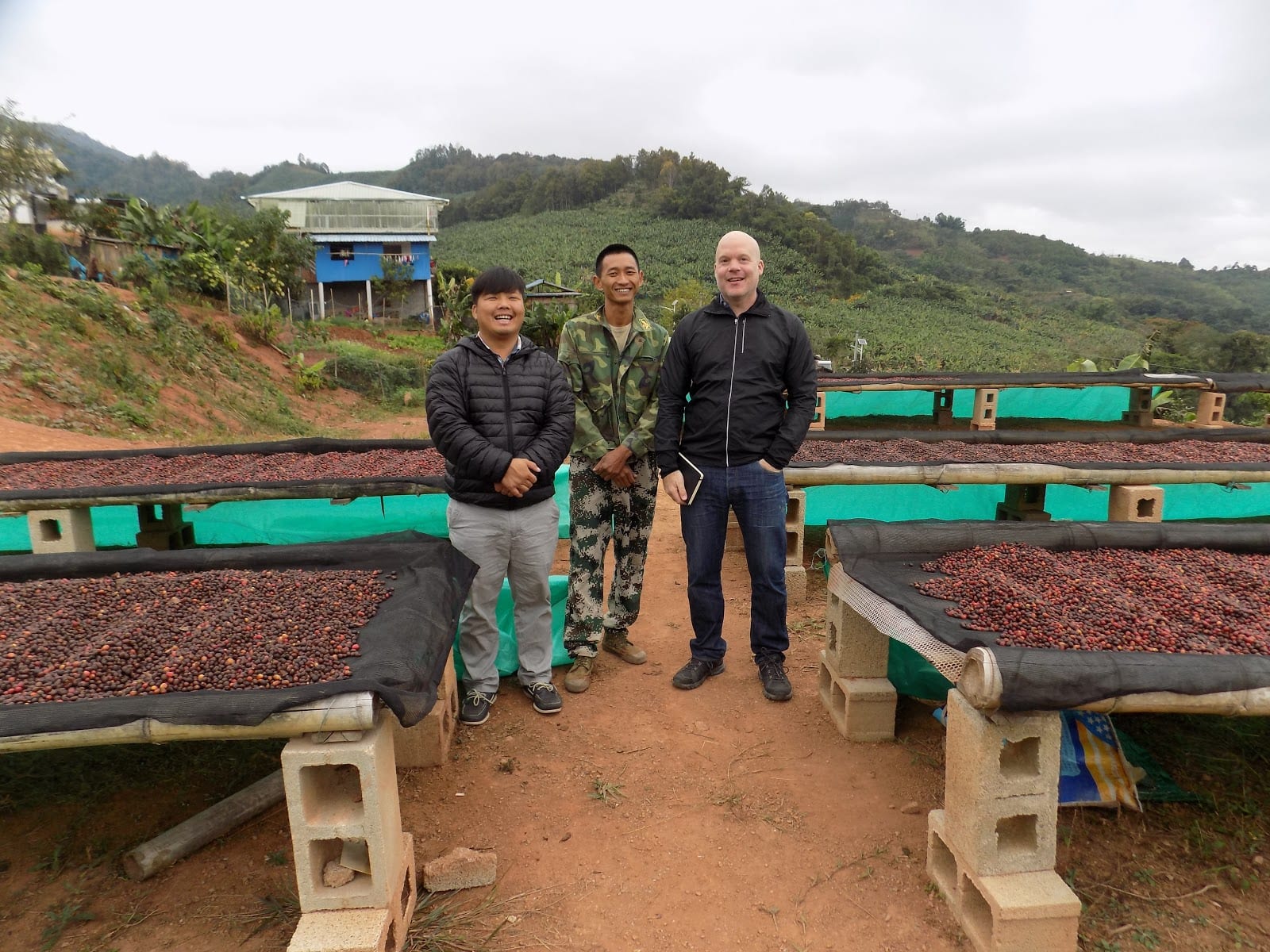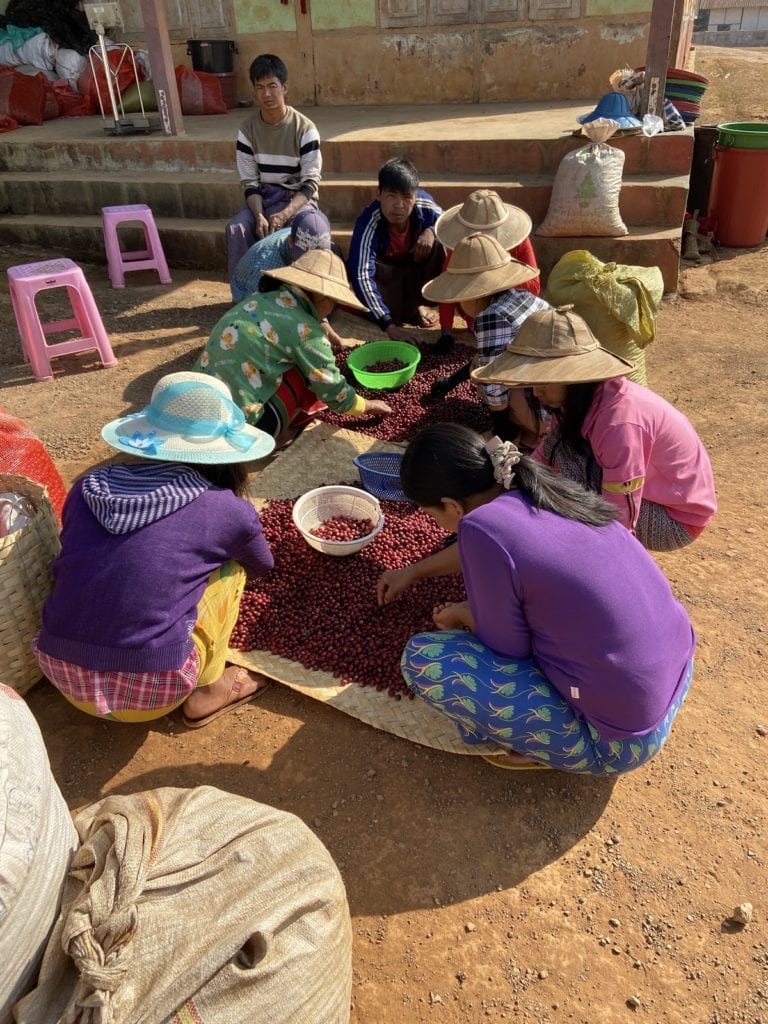
ASK THE IMPORTER – CHRIS & SHIRANI
Last month our Ou Yang coffee, sourced in Yunnan and roasted by Quarter Horse, was included in Dog & Hat’s specialty coffee subscription package. We are big fans of their project, we actually are subscribed to their monthly service! So the green beans we had imported from China made the whole cycle and came back to us ready to grind and enjoy. This happy coincidence triggered a friendly conversation and an interview we want to share with you all.
ASK THE IMPORTER – CHRIS & SHIRANI
Indochina Coffee is run by Shirani and Christian. It’s great to see how their passion for coffee from the region, discovered during their time in Bangkok, has inspired them to build an import business that brings coffee from these wonderful origins to the UK market and directly into your subscription.
How was the business founded, and what was the inspiration?
Shirani: I am of Filipino and Sri Lankan heritage, and I’ve always been fascinated by the really strong coffee history in both countries. Not many people realise that they used to be two of the biggest coffee-producing countries in the world! This inspired me to find out more about coffee production in Asia generally and, as a slow burner, find a way for me to connect more with my heritage through coffee.
Having been based in East London since the early 2010s and enjoying the specialty coffee scene there, we moved to Bangkok for work and started finding out about these amazing coffee producers in Thailand, China, and Myanmar – initially via UN opium replacement programs. When we moved back to London in 2016, we were surprised to see a lack of these origins being offered and decided to do something about it and set up the business.
How has it changed most since it began?
Chris: The consistency of quality of coffee coming out of these origins for sure, as well as people starting to reach out to us expressing an interest in our coffees rather than the other way round! Apart from that, Shirani coming on board full time in 2018, and then getting her Q was a huge step, as was moving into our little Whitechapel office eight months ago.
What is your favourite / more rewarding part of the job?
Spending time with farmers and producers is always humbling, keeps our feet firmly on the ground, and reminds us why we are doing what we do. But equally, seeing our coffee being enjoyed by appreciative drinkers in the UK and Europe gives us a huge buzz.

What’s the hardest part of the job?
Seeing unethical trading practices first-hand and its impact on farmers and producers, particularly by those claiming to be trading responsibly. Battling prejudices and stereotypes about Asian coffees.
What three words best describe the business?
Independent – Responsible – Proudly-Asian!
What’s your favourite place to enjoy a coffee, and what coffee would that be?
Nothing beats staying on a coffee farm, and enjoying a washed coffee on filter first thing in the morning, waiting for the mist to clear and the temperature to rise.
What is most people’s first reaction when you explain which origins you export from?
When we started out, it was very much ‘coffee from China – really?’ as well as the odd disdainful comment about dirty/earthy tasting notes… but as some of our coffees, particularly the more boozy, fruit-forward naturals (such as Ou Yang!) have raised the profile of these origins, there seems to be a lot more openness and less scepticism. A lot has changed in the last couple of years!
Have your conversations with roasters changed as the origins become more established?
We’ve been very lucky to have a handful of roasters who have supported us from the very beginning: witnessing their reactions each season as the coffee has improved year on year has been fantastic. And seeing complete u-turns from roasters who were initially completely dismissive then keen to get some into their roastery has been great. But generally yes, roasters are much more open to trying newer specialty origins from Southeast Asia than they were even just a couple of years ago.
Are trips to origin with roasters something you see as beneficial?
We are working on developing long-term relationships between some specific farmers and roasters, so yes, we hope to spend more time with individual roasters at origin, making the personal connection.
How do you start to build a relationship with a new farmer at origin?
Chris: At first, I had to be fairly proactive at approaching farmers and producers – getting to understand what their challenges were and how we could support them in meeting these was always key. There’s often an assumption that farmers are desperate to export their coffee to the UK and Europe when it’s often really not the case at all! Especially in Southeast Asia where there’s a pretty healthy domestic and regional market going on for specialty coffee already. But it’s also true that opening access to the UK and European specialty markets is absolutely vital to some farmers in some areas, so that’s where we come in. More recently, most of our new relationships have begun via introductions from those who we are already in partnership with.

How are the farmers adapting (new varieties, processing methods, storage, transport, etc.) to the wider market that is opening up for them?
In so many ways! Enabling farmers to understand what roasters and coffee drinkers are looking for in the UK and Europe has really incentivised them to push things forward: particularly in terms of processing, such as increasing quality and cup score with better lot separation as well as experimenting with fermentation and honey processing. But it’s also hugely risky and time consuming for them so we’re always keen to shoulder a lot of that risk and – increasingly – we are working with roasters to join us in creating new ways of partnership working where innovation can work for everyone.

What’s your tip on ‘next big origin/farm’ to look out for?
More specialty coffee from the Philippines – there is a big focus on improving quality amongst Filipino coffee professionals along with support and training from the CQI (Coffee Quality Institute). Regions such as Benguet and Mindanao have the perfect climate and altitude for coffee, so the potential is huge.
Finally, what Dog & Hat combination would you choose?
Labrador in a conical hat!
Thank you, Shirani and Christian, for taking the time to complete this for us!
